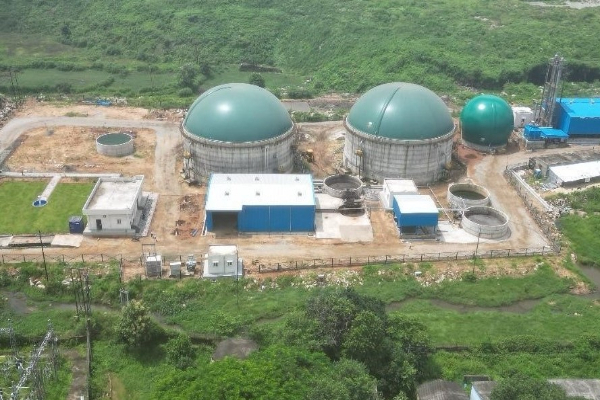Paatil expressed gratitude to Prime Minister Narendra Modi for envisioning the transformative GOBARdhan initiative

The Ministry of Housing and Urban Affairs informed the Minister of initiating construction of 67 CBG plants by March 2025 and addressing issues pertaining to feedstock and site identification
As per GOBARdhan Scheme 37 CBG plants are functional and 133 plants are in various stages of development against the budget announcement target.
In a significant step to review the progress of the GOBARdhan Initiative, Union Minister for Jal Shakti C. R. Paatil, interacted with dignitaries from key nine stakeholder ministries/departments of the sector in New Delhi.
The meeting signifies the importance the Government attaches to the GOBARdhan initiative, which is aimed at transforming organic waste into valuable resources such as CBG and organic manure. This interaction aimed to strengthen collaboration and address the challenges faced, demonstrating the government's unwavering support for innovative and sustainable waste management solutions.
Addressing the gathering, Paatil expressed gratitude to Prime Minister Narendra Modi for envisioning the transformative GOBARdhan initiative, which underscores the Government's commitment to sustainability and a circular economy.
The Union Budget 2023-24 target to establish 200 new CBG plants was a major shot in the arm for GOBARdhan. In furtherance of the same, 37 CBG plants are functional, with 133 plants in various stages of development against the budget announcement target.
There has been an impressive year on year growth in the number of CBG units over the past few years, from only 19 functional CBG plants in 2020 to 125 functional CBG plants currently. Various policy enablers have been implemented to ensure the viability and growth of these plants, promoting a circular economy and sustainable development.
During the discussion, representatives from stakeholder ministries/departments showcased their progress and outlined the challenges encountered in meeting the targets set by the 2024 budget announcement. The Ministry of Petroleum and Natural Gas shared that guidelines on mandatory blending of CBG with CNG (T) and PNG (D) and a Multi-Party Agreement with financial institutions and Oil and Gas Marketing Companies (OGMCs) for financing CBG projects are nearing finalization.
The Ministry apprised the Minister of the fast tracking of the setting up of 195 CBG plants as well as finalization of the CBG pricing under SATAT and the CBG-CGD synchronization scheme.
The Ministry of New and Renewable Energy talked about revising the guidelines of the Waste to Energy scheme to facilitate graded release of Central Financial Assistance.
The Ministry of Housing and Urban Affairs informed the Minister of initiating construction of 67 CBG plants by March 2025 and addressing issues pertaining to feedstock and site identification. It was emphasized that the issues related to offtake and feedstock need to be addressed in a Whole of Government approach to enhance the viability of CBG plants. The categorization of FOM/LFOM as a separate category under the FCO was also highlighted as a crucial step to improve soil health (by increasing its carbon content) as well as for increasing awareness/acceptability of FOM (Fermented Organic Manure)/LFOM (Liquid Fermented Organic Manure) among farmers.
The Minister suggested conducting additional Farmer Education programs near all CBG plants. He further proposed involving banks and financial institutions during the issuance of new Letters of Intent to CBG operators. Addressing the potential of the carbon credit system, he stressed its role as a significant revenue generator for the sector and urged the Government to establish mechanisms for incentivizing this emerging industry. These measures would not only bolster India's net-zero ambitions but also improve the financial sustainability of these initiatives.
Subscribe to our newsletter & stay updated.